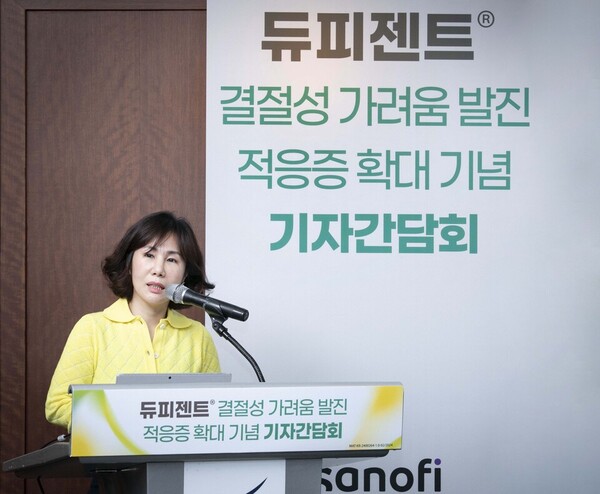Biologic agent Dupixent (dupilumab) has emerged as a new treatment option for moderate-to-severe nodular pruritic rash (prurigo nodularis), for which existing treatments, such as topical steroids and systemic immunosuppressants, have shown little treatment effects.
On Wednesday, Sanofi Korea held a news conference at the Novotel Ambassador Seoul Gangnam Hotel to announce the expansion of Dupixent's indication for prurigo nodularis.

Last December, Dupixent won approval from the Ministry of Food and Drug Safety for treating adult patients aged 18 years and older with moderate to severe nodular lichen planus not adequately controlled by topical treatments or for whom these treatments are not recommended.
Prurigo nodularis is a chronic skin condition characterized by underlying type 2 inflammation. People with prurigo nodularis develop skin-thickened lesions called nodules all over the body and experience severe and persistent itching, which has one of the greatest impacts on the quality of life of all inflammatory skin conditions.
Previously, limited options, like topical steroids and systemic immunosuppressants, had been available to treat prurigo nodularis, with topical steroids carrying safety risks in long-term use. With the latest indication expansion, Dupixent has emerged as the only biologic approved in the U.S. and Korea for treating moderate-to-severe prurigo nodularis in patients 18 and older.
"Among various inflammatory skin diseases, nodular pruritus has the greatest impact on the quality of life due to intense itching," said Dr. Ahn Ji-young, professor of dermatology at the National Medical Center, who presented a study titled "Dupixent, a New Treatment Option for Nodular Pruritic Rash (Ichthyosis)."
More than 60 percent of patients suffer from poor sleep due to chronic itching, and it is often accompanied by psychiatric disorders, including depression and anxiety, Professor Ahn noted.
"Despite this high burden of disease, there was no cure for nodular pruritus, and about 60 percent of patients are not satisfied with their treatment. Furthermore, 73 percent of patients are not satisfied with the topical steroids used as a substitute for treatment, creating an urgent need for new therapeutic approaches,” Ahn said. “With this indication expansion for Dupixent, we hope to significantly improve the quality of life for patients with nodular lichen planus by providing them with a first-in-class medication."
Professor Ahn explained that nodular bullae are associated with type 2 inflammatory diseases, such as atopic dermatitis and asthma, noting that nearly half of all patients with nodular bullae are atopic and have current or past atopic comorbidities, such as atopic dermatitis or asthma.
"Dupixent targets the interleukin-4 (IL-4) and interleukin-13 (IL-13) cytokines, which are key players in type 2 inflammation, the underlying cause of nodular bullae," she added.
Releasing the results of PRIME and PRIME2, phase 3 clinical studies that supported the expanded indication for Dupixent, Ahn said that these studies improve pruritus, nodule clearance, and quality of life in patients with nodular lichen planus.
"In PRIME and PRIME2, 60 percent and 57.7 percent of patients in the Dupixent arm experienced significant pruritus improvement at 24 weeks, and 48 percent and 45 percent achieved clear or nearly clear skin," she said. "We also saw significant improvements in quality of life in this group compared to placebo.”
Regarding safety, no significant adverse events were reported. According to Professor Ahn, no laboratory monitoring was required before or during treatment, including cardiovascular disease, a major risk factor for people in their 50s and 60s with a high incidence of nodular pruritus.
"In both studies, Dupixent's safety profile was consistent with that seen in the approved indication," Ahn said. "Safety considerations are particularly important given the high prevalence of nodular bilateral disease among people in their 50s and 60s.”
Dupixent is an immunomodulator co-developed by Sanofi and Regeneron that targets and modulates the signaling of IL-4 and IL-13, two key players in type 2 inflammation. Since its approval in March 2018 for treating adult patients with moderate-to-severe atopic dermatitis, Dupixent has steadily expanded its indications, including juvenile atopic dermatitis and the maintenance treatment of severe eosinophilic asthma in adolescents and adults.
Related articles
- Atopic dermatitis experts call for allowing ‘cross-dosing’ of biologics with JAK inhibitors
- Atopic dermatitis drug Adtralza passes insurance panel at ultrafast speed
- 2 new JAK inhibitors, Jyseleca and Jakavi, get insurance benefits this month
- Sanofi gets Korean license for invasive meningococcal vaccine MenQuadfi

